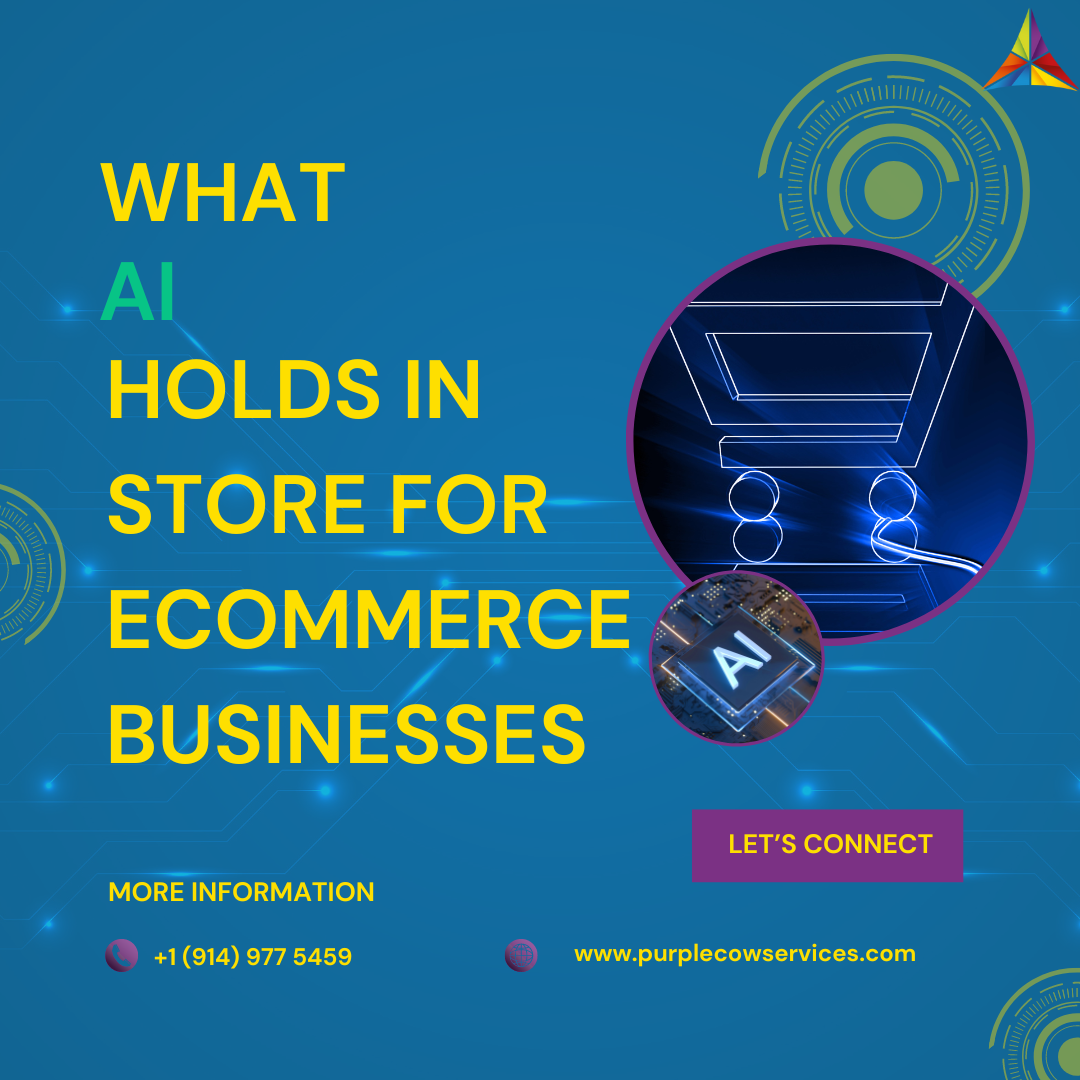As technological advancements continue to redefine industries, AI stands at the forefront of innovation, revolutionizing several sectors like healthcare, finance, and manufacturing.
Share This Story, Choose Your Platform!
In healthcare, AI’s prowess in image analysis is reshaping diagnostics, facilitating early disease detection and personalized treatment plans, transforming patient outcomes. Similarly, in finance, AI-driven algorithms are elevating security measures by enhancing fraud detection and refining investment strategies, fostering a more informed financial landscape. Meanwhile, the manufacturing sector benefits from AI-powered automation, as it optimizes production processes, minimizes downtime, and ensures impeccable product quality through predictive maintenance techniques.
Amidst these transformations, the eCommerce realm is not to be overlooked, as AI shapes customer interactions, offering tailored product recommendations that heighten engagement, while AI-driven chatbots streamline the shopping journey, culminating in elevated customer satisfaction and loyalty. In this blog, we delve into the multifaceted impacts of AI on eCommerce businesses, unraveling the profound potential that AI holds for shaping the future of online retail.
Types of AI Technology Used in eCommerce
Machine Learning Algorithms: These analyze customer behavior patterns, purchase history, and preferences to refine product recommendations and optimize marketing strategies.
Natural Language Processing (NLP): Employed in chatbots and search algorithms, NLP enhances customer interactions, enabling more accurate query responses.
Computer Vision: Used for visual search and image recognition, enhancing user experience by allowing customers to find products based on images.
Predictive Analytics: This technology forecasts future trends and customer demands, aiding in inventory management and preventing stockouts.
Reinforcement Learning: Implemented in dynamic pricing strategies, it adapts prices in real-time based on market conditions and consumer behavior.
Generative Adversarial Networks (GANs): Used for creating synthetic product images and enhancing the visual appeal of online catalogs.
Recommendation Systems: Utilizing collaborative and content-based filtering, these systems provide customers with relevant product suggestions.
7 Applications of AI in eCommerce
Personalized Product Recommendations
One of the cornerstones of AI’s impact on eCommerce is the realm of personalized product recommendations. These recommendations leverage a wealth of data, including customer browsing habits and purchase history, to suggest products tailored to individual preferences. This personal touch not only enhances the user experience but also fosters increased engagement and drives higher conversion rates. AI optimizes cross-selling and upselling by suggesting complementary products and premium alternatives, capitalizing on the customer’s existing choices. What sets AI-powered recommendations apart is its ability to continuously learn and adapt over time, ensuring that the suggestions reflect evolving customer preferences accurately. Moreover, the AI engine orchestrates personalized emails and notifications based on user behavior, a strategic approach that improves customer retention and cultivates loyalty. Beyond this, AI accounts for contextual factors like seasonality and trends to offer timely and relevant product suggestions. The combination of collaborative and content-based filtering mechanisms ensures a blend of accurate and diverse recommendations. By fostering a deeper connection between customers and the online store, personalized recommendations often translate to increased average order values, capturing the essence of modern consumer expectations for customized shopping experiences.
Chatbots and Virtual Assistants
The advent of AI-driven chatbots and virtual assistants marks a significant transformation in how customers interact with eCommerce platforms. These intelligent tools deliver real-time responses to customer inquiries, elevating user satisfaction by providing immediate solutions. Furthermore, virtual assistants take the customer journey a step further by acting as guides through the intricacies of online shopping, answering questions, and offering valuable assistance. Operating round-the-clock, chatbots ensure continuous customer support, thus reducing response times and meeting customer needs efficiently. Natural Language Processing equips chatbots with the ability to understand and respond to complex queries in a manner reminiscent of human interaction. The added advantage is that chatbots can adeptly manage multiple conversations simultaneously, mitigating waiting times for customers seeking assistance. Integration with messaging applications facilitates seamless communication, ensuring customers are met on their preferred platforms. These AI-powered solutions offer not only consistent and accurate information but also contribute to product discovery by asking questions and suggesting suitable options. Furthermore, AI-driven virtual assistants elevate user engagement by offering personalized shopping guidance. Importantly, these tools also alleviate human resources, enabling the staff to focus on more intricate tasks and critical facets of the business.
Fraud Detection and Prevention
In the realm of eCommerce security, AI plays a proactive role in detecting and preventing fraudulent activities. The heart of this application lies in AI algorithms, which meticulously analyze large volumes of data to detect anomalies and patterns associated with fraudulent transactions. Real-time monitoring of transactions proves indispensable in identifying suspicious activities, leading to timely intervention that minimizes financial losses and sustains customer trust. The dynamic nature of AI’s machine learning models ensures the ability to adapt to new fraud tactics, thus perpetuating ongoing protection against evolving threats. AI assesses a spectrum of factors—transaction history, geographical location, and behavioral patterns—to accurately gauge risk levels, enabling the detection of potential threats with precision. Automated fraud detection is another boon, as it expedites legitimate transactions, significantly enhancing operational efficiency. The continuous learning mechanism inherent in AI refines its capacity to distinguish between legitimate and fraudulent transactions, thereby augmenting accuracy over time. Beyond financial considerations, preventing fraud through AI-driven solutions bolsters customer confidence and loyalty, contributing to the overall integrity and sustainability of eCommerce platforms. Rapid responses to potential threats are essential in preventing unauthorized access and unauthorized purchases, thus creating a secure and seamless shopping environment. Importantly, the integration of AI-driven fraud prevention tools adheres to industry regulations, bolstering security measures and ensuring alignment with established legal frameworks.
Inventory Management
Another arena where AI demonstrates its prowess within eCommerce is inventory management. By harnessing the predictive capabilities of AI, businesses can optimize inventory levels to maintain the delicate balance between supply and demand. AI’s predictive prowess is particularly evident in its ability to forecast demand trends by leveraging historical data and external factors. This enables businesses to strategically plan their inventory, minimizing the likelihood of stockouts that can result in missed sales opportunities. Conversely, AI’s application also extends to preventing overstock scenarios that might lead to unnecessary storage costs and product wastage. The real-time monitoring and data analysis facilitated by AI empowers businesses to adapt their inventory strategies promptly, responding to the dynamic shifts in market conditions. Automated inventory replenishment is a key feature that ensures products remain available to customers when needed, thereby enhancing overall customer satisfaction. This also contributes to reducing manual errors, an imperative for bolstering operational efficiency. The integration of AI with supply chain management brings further optimization by streamlining logistics, reducing delays, and enhancing order fulfillment processes. Moreover, just-in-time inventory practices are enhanced by AI, resulting in lower carrying costs and improved cash flow management. Through the optimization of inventory, AI enables businesses to channel their resources toward high-demand products, thereby boosting profitability. Crucially, AI-driven inventory management also plays a pivotal role in preventing both stockouts and overstocks, fostering a smoother and more satisfying customer experience and ultimately driving increased revenue generation.
Dynamic Pricing
The concept of dynamic pricing takes center stage in the eCommerce landscape with the aid of AI-powered algorithms. These algorithms harness AI’s analytical capabilities to scrutinize market conditions, competitor prices, and even customer behavior, all in real-time. This dynamic approach to pricing optimization strikes a delicate balance between competitiveness and profitability. During peak demand periods, surge pricing is executed seamlessly through automation, fine-tuning pricing strategies for optimal results. AI’s decision-making process takes into account a myriad of factors, including inventory levels, historical data, and customer segmentation, ensuring that the prices set are not only competitive but also considerate of the business’s bottom line. An essential advantage of AI-driven dynamic pricing is the ability to respond swiftly to market fluctuations, ensuring a competitive stance without the need for manual intervention. The personalization extends to pricing as well, with AI facilitating personalized pricing based on customer segments or loyalty levels, further enhancing customer relationships. In the end, dynamic pricing becomes an instrument for achieving higher conversion rates during price-sensitive periods, optimizing the clearance of excess inventory, and elevating the overall efficiency of revenue management. AI’s impact on pricing strategies culminates in a competitive edge that maintains profitability without compromising market presence.
Customer Churn Prediction
AI’s predictive prowess extends to customer churn prediction, a crucial aspect of maintaining customer retention in the eCommerce sphere. By analyzing customer behavior, purchase history, and engagement metrics, AI can forecast potential churners—customers who are at risk of discontinuing their engagement with a business. The early identification of these at-risk customers empowers businesses to take proactive measures to retain them. Machine learning models delve into patterns that might indicate disengagement or dissatisfaction, allowing the business to strategize tailored offers, loyalty rewards, or personalized communication to re-engage these customers. By effectively reducing customer attrition, businesses can preserve their customer base and safeguard revenue streams. The insights provided by AI-driven churn predictions also offer actionable information for improving products and services, which can further enhance customer satisfaction and loyalty. Automated alerts generated by the AI notify teams when a customer’s behavior suggests an imminent churn, enabling timely interventions. Regular monitoring ensures the accuracy and relevance of these churn prediction models, reinforcing their role in customer-centric strategies and enhancing the overall lifetime value of customers. The informed allocation of resources towards retaining high-value customers and improving overall retention rates is facilitated by AI’s insights into customer churn dynamics.
Generative AI
Generative AI steps into the eCommerce realm by facilitating the creation of novel content, such as product images, descriptions, or designs. This technology’s contribution to product catalogs is profound, infusing diverse visuals and creative elements that capture customers’ attention. The capacity to generate unique product variations enriches customer choices and engenders a sense of novelty, fostering engagement. Moreover, the expansion of customization options allows customers to visualize personalized products, enhancing their sense of ownership. An impactful outcome of generative AI is the acceleration of content creation processes, as it automates the generation of marketing materials. Brands can strike a harmonious balance between consistency in branding and exploration of innovative approaches through the capabilities of generative AI. This technology further aids in creating compelling visuals and captivating content for advertising campaigns, elevating the overall marketing strategy. In this context, generative AI assumes the role of a creative collaborator, enhancing content creation with fresh perspectives. Ultimately, by infusing a sense of novelty and intrigue into the shopping experience, generative AI adds value to the eCommerce journey, aligning with modern consumer expectations for a stimulating and captivating shopping environment.
Benefits and Challenges of AI in eCommerce
The introduction of AI has ushered in a multitude of benefits for the eCommerce sector, revolutionizing the way businesses operate and interact with customers.
Benefits of Using AI in eCommerce
Improved Customer Experience: AI tailors recommendations and interactions, creating personalized and engaging shopping experiences that resonate with individual preferences.
Enhanced Efficiency: Automation streamlines operations, optimizing inventory management and customer support processes.
Data-Driven Insights: AI analytics offer valuable information about customer behavior and market trends, guiding strategic decision-making.
Increased Conversions: Personalized recommendations and dynamic pricing strategies bolster conversion rates, translating into higher sales.
Fraud Prevention: AI detects and prevents fraudulent transactions, ensuring a secure shopping environment for both customers and businesses.
Better Inventory Management: Demand forecasting minimizes stockouts and excess inventory costs, leading to improved resource allocation.
Customer Loyalty: AI-driven insights facilitate customer retention through proactive engagement strategies, building long-lasting relationships.
Competitive Edge: AI enables businesses to swiftly adapt to market changes, maintaining a competitive stance in the industry.
Creative Possibilities: Generative AI sparks innovation by enhancing product visuals and marketing content, captivating customers’ attention.
Revenue Growth: The comprehensive impact of AI across various facets of eCommerce contributes to overall revenue growth and profitability.
Challenges of Using AI in eCommerce
While the advantages of AI are substantial, there are notable challenges that businesses must navigate to fully harness its potential.
Data Quality and Privacy: Maintaining high-quality data while safeguarding customer privacy is paramount for effective AI utilization.
Implementation Costs: Integrating AI technologies requires substantial investments in infrastructure and expertise.
Algorithm Bias: Biased training data can result in AI systems reflecting unfair biases, necessitating continuous monitoring.
Complexity: Implementing and maintaining AI can be complex, demanding specialized skills and resources.
Customer Acceptance: Ensuring customer acceptance and trust in AI-driven experiences requires strategic communication and education.
Algorithm Transparency: Understanding complex AI decision-making processes can be challenging, requiring efforts to enhance transparency.
Integration Issues: Integrating AI with existing systems can lead to technical challenges that need to be overcome.
Overreliance on AI: Striking a balance between human expertise and AI involvement is crucial for optimal results.
Rapid Technological Changes: Keeping up with evolving AI technologies requires businesses to stay agile and adaptable.
Legal and Regulatory Compliance: Complying with data protection and AI ethics regulations is essential to maintain ethical AI practices.
How Is AI Changing the eCommerce Industry?
The influence of AI is reshaping the eCommerce landscape in profound ways, revolutionizing customer experiences and operational efficiency.
Personalization Revolution: AI enables hyper-personalized shopping experiences, catering to customers’ unique preferences and demands.
Customer-Centric Service: AI-powered chatbots and virtual assistants provide round-the-clock support, enhancing customer satisfaction.
Fraud Prevention: AI acts as a safeguard by identifying and preventing fraudulent transactions, fostering a safer online environment.
Optimized Operations: AI streamlines various aspects like inventory management, pricing, and demand forecasting, leading to cost savings.
Innovative Marketing: Generative AI breathes new life into marketing efforts, generating fresh and captivating content that captures customer attention.
Data-Driven Decisions: AI analytics provide crucial insights for making informed decisions, from product development to targeted marketing campaigns.
Improved Efficiency: Automation frees up human resources, allowing teams to focus on high-value tasks and strategic initiatives.
How Is Machine Learning Used in eCommerce?
Machine learning is reshaping eCommerce by enabling tailored strategies and efficient operations.
Recommendation Systems: Machine learning algorithms power personalized product recommendations that enhance customer engagement.
Customer Segmentation: Machine learning divides customers into segments, enabling targeted marketing campaigns for better results.
Demand Forecasting: Machine learning predicts demand patterns, optimizing inventory management and replenishment strategies.
Search Optimization: Machine learning enhances search algorithms, making it easier for customers to find products efficiently.
Dynamic Pricing: Machine learning adjusts prices in real-time based on market dynamics and customer behavior, enhancing competitiveness.
Churn Prediction: Machine learning identifies potential churners, helping businesses implement retention strategies effectively.
Fraud Detection: Machine learning identifies unusual transaction patterns that signify fraud, enhancing security measures.
How Is AI Being Used in eCommerce Marketing?
AI is transforming eCommerce marketing by tailoring strategies to individual customers and enhancing engagement.
Personalized Campaigns: AI tailors marketing messages to customer preferences and behaviors, driving higher engagement.
Customer Journey Mapping: AI tracks customer interactions, optimizing touchpoints for a seamless shopping experience.
Predictive Analytics: AI predicts customer behavior, aiding in designing effective marketing strategies and campaigns.
A/B Testing: AI automates A/B tests, identifying the most impactful variations for marketing efforts.
Content Generation: Generative AI creates diverse marketing content, from compelling product descriptions to engaging social media posts.
Segmentation and Targeting: AI analyzes customer data to segment and target specific audiences, maximizing marketing impact.
Email Automation: AI-driven systems personalize email content and timing, leading to higher open and conversion rates.
Conclusion
The eCommerce industry is undergoing a profound metamorphosis with the advent of AI. This journey represents not only an evolution in shopping experiences but a redefinition of how businesses connect with consumers. As AI continues to unravel new dimensions of potential, the future of eCommerce shines brightly with promise, holding within its grasp the power to craft extraordinary and tailored journeys for every online shopper.
Discover the Future of Shopping with AI-Powered eCommerce. Elevate customer experiences with personalized product recommendations, real-time chatbots, and efficient inventory management. Harness the potential of AI to drive conversions, enhance customer loyalty, and stay competitive in the dynamic world of online retail. Revolutionize your eCommerce journey today!
Unleash the power of cutting-edge AI solutions to transform your eCommerce ventures into the future of business innovation. Embrace the extraordinary eCommerce growth with Purple Cow.
Share This Story, Choose Your Platform!
In This Blog:

















